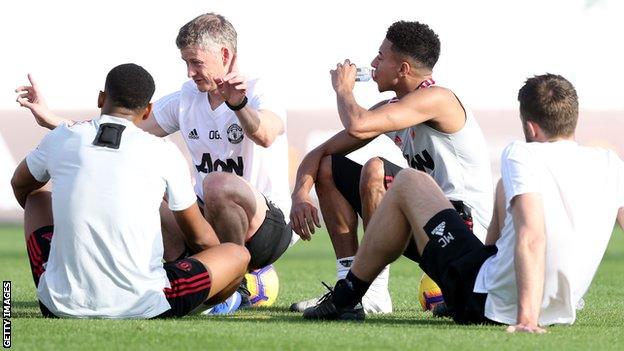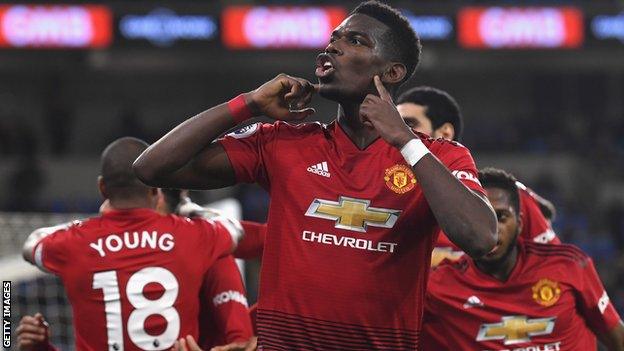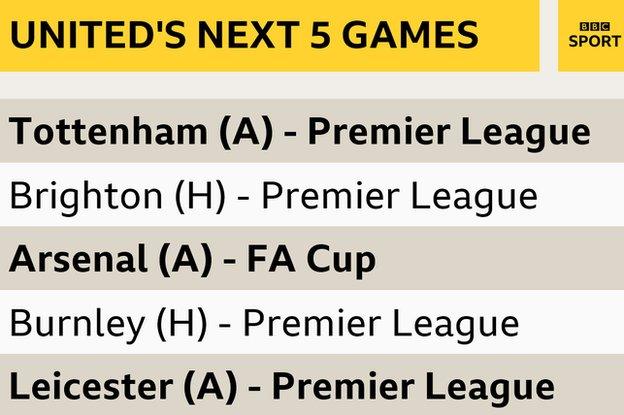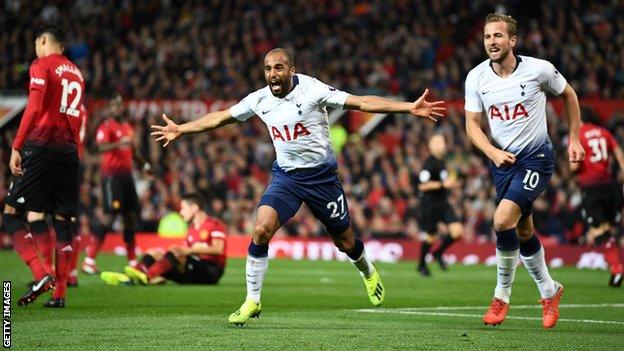Ole Gunnar Solskjaer: Will Man Utd interim manager pass Tottenham test?
- Published
- comments

Solskjaer has said he does not want to leave his role as United's interim boss in the summer
Ole Gunnar Solskjaer and his Manchester United players have been enjoying the heat and relaxation of Dubai in the days before Sunday's Wembley meeting with Tottenham - and have not been shy about letting the world know.
From a relentless pictorial barrage of squad members and management smiling in training, to 18-year-old Angel Gomes serenading his team-mates, through to videos of Romelu Lukaku and Anthony Martial enjoying the Dubai dining experience, the message is clear: 'Jose Mourinho has gone and you cannot believe how joyful we are now.'
Solskjaer - an interim anti-Mourinho - has emulated the great Sir Matt Busby by winning his first five games, but his beaming charm offensive has been aided by a relatively friendly introductory fixture list that could have been hand-picked by the 45-year-old Norwegian.
The talk that Solskjaer might land the job full-time has got louder and louder - but surely no truly convincing evidence has yet been presented to back up that theory?

Pogba has scored four goals since Solskjaer returned to the club
Now, however, it gets serious.
When Solskjaer takes United to face Spurs on Sunday, we will discover more about his credentials, his credibility as a potential full-time successor and whether the smiles can be backed up with a big result rather than some early flat-track bullying.
The run of games faced so far has comprised Huddersfield, Bournemouth and Reading at home, and Cardiff and Newcastle away.
The statistics are impressive: five from five, 16 goals and only three against and an average of 61.63% possession over those matches. He could not have done any more.
Throw in the constant claims that the clouds rolled away once Mourinho paid his extras and drove away from the Lowry Hotel after losing limply to Liverpool, and everything at Old Trafford is coming up roses.
Solskjaer has got the results required, unified a squad previously at odds with its manager, reintegrated the huge talent of Paul Pogba and formed a sound coaching team with Michael Carrick, the returning wise old head Mike Phelan and Kieran McKenna.
He has a bottomless pit of goodwill among everyone connected with Manchester United after 11 seasons at the club, which brought 126 goals in 366 appearances, including the dramatic winner in the 1999 Champions League final against Bayern Munich in Barcelona.
And, crucially, he is naturally more comfortable in his surroundings at the 'Theatre of Dreams' than any of the three successors to Sir Alex Ferguson: the out-of-his depth David Moyes, Louis van Gaal and the confrontational, divisive Mourinho.
So far. So good.
The true test comes now.

If Solskjaer can prove this is a serious rejuvenation by fashioning a result at Spurs - a team still right in contention for the Premier League title, and handsome winners at Old Trafford in August - then all the positivity might actually acquire substance.
And Solskjaer has the opportunity to strike a real blow for his profile if he can outmanoeuvre Mauricio Pochettino, the favourite to be the next manager at Old Trafford, on Sunday.
The odds, however, must still be on United going for an experienced manager of proven quality rather than a personality, no matter how engaging or ingrained in the foundations of Old Trafford he might be.
And don't forget Solskjaer, effectively on loan from Norwegian club Molde, failed miserably in his previous experience in the Premier League.
That was at Cardiff, where he won only five of 25 league games over an eight-month period in which he oversaw relegation and was sacked in September 2014 with the Bluebirds 17th in the Championship.

Tottenham were 3-0 winners at Old Trafford in August
And as and when the run of victories comes to an end, there will be other tests.
What happens when he delivers bad news? The history of this season suggests Manchester United's players are not quite as smiley when the going is rough or when they are receiving messages that are more hardline, which led to so much discontent under Mourinho.
United's squad, and star players such as Pogba and Alexis Sanchez, were able to use Mourinho as their shield. How will they, and others, react when Solskjaer tells them something they do not like?
And what about United's hierarchy who, with the best will in the world, were unlikely to have had Solskjaer in mind as the man to drive them into a golden future post-Mourinho?
Remember the cautionary tale of Chelsea owner Roman Abramovich and Roberto di Matteo.
The Italian succeeded Andre Villas-Boas with Chelsea on their knees in March 2012 and in two months had won the FA Cup and the trophy the Russian wanted most of all - the Champions League.
It was the greatest interim manager audition in history. Abramovich never seemed convinced but was in a corner.
He eventually gave Di Matteo, a manager of modest previous attainments, a two-year deal. He was sacked in November and has since reverted to modest mode.
And yet Solskjaer, if he can prove these early results are not simply a soft landing, has the capacity to give executive vice-chairman Ed Woodward a similar dilemma.
The top four and the Champions League places are only six points away and key dates are also coming at Arsenal in the FA Cup fourth round and against Paris St-Germain in the last 16 of the Champions League.
If Solskjaer can steer United through these two assignments, the bandwagon will be rolling at high speed.
One thing is certain - we will know a lot more about how good Solskjaer and this miraculously rejuvenated Red Devils team are on Sunday night.
And a lot more about whether Solskjaer can really be taken seriously as a future Manchester United manager.